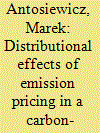| Srl | Item |
| 1 |
ID:
176685


|
|
|
|
|
| Summary/Abstract |
There is an ongoing reform in coal taxation in China, from a quantity-based to a price-based approach. While the coal tax could play an important role in resource conservation and air pollution reduction, its distributional effect is not well studied. This paper investigates the distributional effect of China's coal taxes on households before and after the reform. We find that about 30 percent of rural households and six percent of urban households are directly affected by the coal taxes, and that the directly affected households tend to be poor. We also find that provinces are affected differently by the coal taxes; the provinces that are more affected tend to have lower household income. By the Suits Index, we find that both the quantity-based and price-based coal taxes are regressive for residential consumers in China, and that the coal taxation reform had little effect on the regressivity of the coal tax. By simulation, we find that the regressivity of the coal tax could be reduced if the tax rate were set to be positively correlated with provincial household income.
|
|
|
|
|
|
|
|
|
|
|
|
|
|
|
|
| 2 |
ID:
183053


|
|
|
|
|
| Summary/Abstract |
We assess the distributional impact of introducing a carbon tax in a small open economy, using the case of Poland. We use a dynamic general equilibrium model with a search mechanism in the labour market, soft-linked to a microsimulation model based on household budget survey data. We evaluate the impact on various income groups and on inequality. We account for four key channels: the direct (energy) and indirect (other goods) price effects, behavioural adjustment of consumption, and changes in labour income. We consider three of ways to recycle the carbon tax revenue: lump-sum transfer, energy price subsidies, and labour tax reduction. We find that the distributional effects depend on the recycling of revenues. Using them to reduce labor taxation attenuates the negative effect of carbon tax on GDP and employment but increases inequality compared to a lump-sum transfer to households. This finding highlights the trade-off between efficiency and equity. Our results could be relevant for other countries producing fossil fuels, such as South Africa, Germany, or Australia.
|
|
|
|
|
|
|
|
|
|
|
|
|
|
|
|